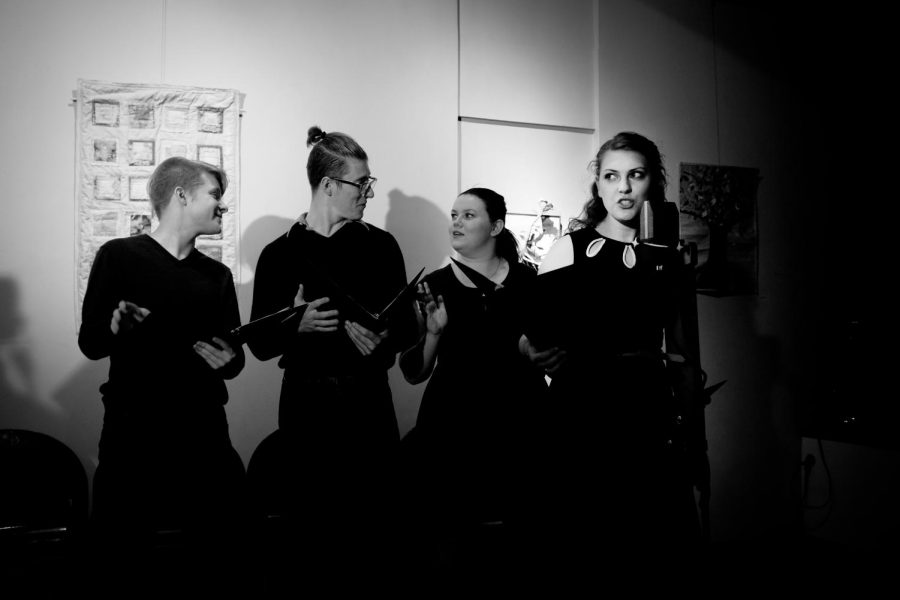War at Home
Actors read their lines into two microphones during their performance on Tuesday, April 26.
May 2, 2018
With her vibrant red hair and reserved persona, Easton Benson can be described as intelligent, determined, influential, and a doppelganger to the mermaid Ariel.
Benson is an avid reader, an advocate for the Diversity and Equity Center, and an actress. Now, Benson can add “play writer” to her resume.
On April 26, “War at Home,” a radio drama based on the lives of the Tuskegee Airmen, the first all-black squadron, debuted.
Benson has had the idea to write a radio drama based on the highly decorated group of historic African-Americans in summer 2017.
Benson wanted the main focus of the play to be about the treatment of soldiers in combat once they arrived back into civilian life.
In order to make her play as accurate as possible, Benson spent weeks researching World War II and the events within “War at Home” as well as trying to envision the life of a soldier from the greatest generation.
“The idea of soldiers with Post Traumatic Stress Disorder (PTSD) has evolved through the history of war. I found all these amazing stories that just had to be told,” Benson said when describing her research.
The radio play discusses and exposes the realities of war, conflict, and combat through three characters. One character is a Tuskegee aviator, another is a modern day soldier from Afghanistan battling PTSD, and the third is a Japanese-American nurse from Vietnam.
The play was made to show the true effects of racism, warfare, and class structure that represent the different mental and social struggles soldiers battle when they arrive back home.
Benson’s drama was inspired by her grandparents and immediate loved ones who have been affected by the repercussions of war.
“I have always had an interest and heart for military, combat, and conflict and how those things that affect people’s lives in ways society doesn’t always address,” Benson said on opening night.
The play was performed in the historic 420 building in downtown Ellensburg. Filled with students, friends, and veterans, the play was impassioned with the truths of mental illness surrounding how soldiers are treated once they’ve fought for their country, and how they are then shoved back into society with no help from the people around them.
Benson says it’s not that loved ones and confidantes aren’t there to support and encourage returning soldiers, it’s that the effects of war have transformed soldiers into who they weren’t before combat.
The negative aftermaths of fighting for your country aren’t exemplified like the ideas of traveling away from home or exploring unknown regions, when military recruits beg high school graduates to take a stand to represent their country and fight for their Constitutional freedoms.
Nicholas Howe, one of CWU’s theatre department students was “super excited” as well to be a part of the play.
“Last night’s performance went phenomenal so I’m assuming tonight will be too,” Howe said.
Christopher Jackson, another student actor, plays a veteran from Afghanistan. Jackson took the role to be a part of a story that addresses modern day struggles of war.
“I think the whole idea of the play is fascinating and I knew almost immediately I wanted to be a part of this production,” Jackson said.
Both evenings, the play ended with a round of applause not just for the writing itself, and the reality of war front conflict surrounding the play, but the way the actors and actresses who performed showed such emotion and transparency.
Benson, as well as those in attendance, couldn’t have been any prouder with the production and to have a new outlook on the social, mental, and psychological struggles soldiers have once returning home.


